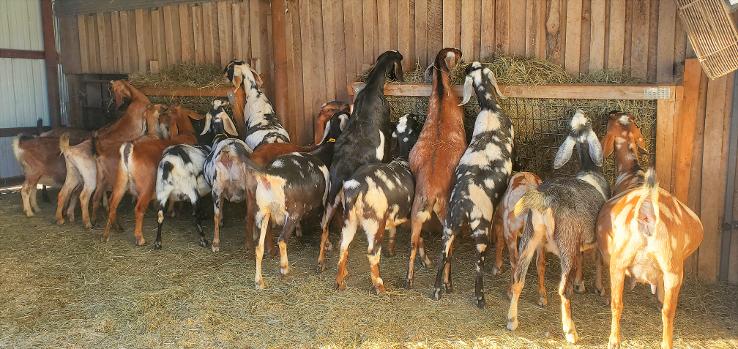What We Feed and Why

We have a lot of people ask us what we feed our goat herd so here is what we feed and why. The bulk of our goats' diet is fresh browse and high quality hay. We feed locally sourced straight alfalfa hay as well as homegrown grass/clover mix hay. Our goats have free access to fresh water at all times as well as a good loose mineral. Beyond that we also utilize:
Does
16% Custom Feed Mix: We have a custom feed mixed for our girls formulated by our nutritionist that is balanced specifically for lactating animals. This provides a nice base for the following supplements:
Whole Cottonseed: Whole cottonseed is an excellent source of fat, protein, and effective fiber which has the potential to increase milk production and butterfat when added to a dairy ration. The high level of energy from cottonseed is derived from a fat source rather than a starch source. The significance of that is the effect it has on the rumen environment. When starch is added to a ruminant's diet that is eating forages, the starch digesting microorganisms (amylotic) begin to increase in numbers at the expense of fiber digesting microorganisms (cellulotic) and make the rumen environment more acidic. At some point, the greater acidity will reduce fiber digestion because of the decrease in cellulotic organisms. However, with a fat-derived energy source, you do not have a negative impact on fiber digestion, making whole cottonseed a great source of rumen-friendly energy. Whole cottonseed is also the only supplement with "roughage factor" fiber as well as high energy.
Kelp Meal: It is almost impossible to find any supplement that is so rich in macro and micronutrients as kelp! Among others, it is rich in calcium, copper, dietary sodium, fiber, folate, iodine, iron, magnesium, manganese, pantothenic acid, riboflavin, vitamin C, vitamin K, and zinc. Kelp's rich source of over 60+ microelements spurred groundbreaking research. Chelated micro mineral sources were discovered in various seaweeds that proved to be more efficient than conventional inorganic sources for microelement supplementation.
The International Animal Journal published a study in 2014 evaluating seaweeds harvested from the Galician coast in Spain as a mineral source for organic dairy cattle. When comparing how cows supplemented with kelp fared against those not fed kelp, the researchers discovered some interesting results. The kelp supplement significantly improved the animals' mineral status, particularly iodine and selenium that were low on the farm.
Also published in 2014, a review out of the Journal of Applied Psychology claims that the studies on seaweed products for animals have shown that kelp and other seaweeds contain "prebiotic potencies at least five times that of the reference prebiotic inulin with additional performance-enhancing benefits in animal rations that rival antibiotic inclusions." Not to be confused with probiotics, prebiotics are specialized plant fibers that nourish the good bacteria already in the gut. These plant fibers are indigestible and basically fertilize the good bacteria (probiotics) in the gut. Prebiotics and probiotics are required for maximum health.
Generator Elite DFM: Generator Elite is a direct fed microbial that contains multiple strains of beneficial microbials, including Propionibacteria (P5, P63), lactic acid bacteria and yeast which produce enzymes and B-vitamins to help support feed intake, as well as digestive enzymes. It helps support digestive health during high milk production, hot weather, ration changes, pre- and post-partum periods, etc by replenishing beneficial digestive organisms, supporting appetite, maintaining healthy rumen pH, and aiding dry matter intake.
Bucks and Kids
Beet Pulp Shreds with Molasses: Beet pulp is a highly digestible fiber that has higher energy than hay so when it is fed in addition to normal grain levels, it ends up replacing some of the hay, thus adding more energy than the hay. Ultimately, the animal takes in more calories. Because it is fiber energy it doesn't cause pH drops in the rumen like grain can. The increased calories can help keep production up and keep the rumen healthy by being an intermediate source for energy between grain and hay.
Beet pulp is also considered a prebiotic, meaning it is beneficial to the millions of microbes in the gut. A robust, well-functioning microbiome contributes to overall health. Byproducts of microbial fermentation of beet pulp in the gut include volatile fatty acids which are absorbed and turned into energy. This energy does not cause a spike in glucose or insulin and is released slowly for a more steady supply. Beet pulp is a common ingredient in commercial grain concentrates because of its energy density and benefit to the microbiome.
I soak beet pulp in water (cold water in hot weather; hot water in cold weather) which helps keep everyone well hydrated and comfortable. Bucks are fed this daily year round.
Pro Bac C: Our kids are all bottle raised and Pro Bac C is given daily in their bottles until they are weaned. Not only does this help control coccidiosis but it also contains highly concentrated probiotics, live naturally occurring microorganisms, and yeast culture to enhance intestinal integrity, plus high levels of vitamins, such as A, D3, E and B12, to provide nutritional support in the presence of coccidiosis, E. coli, Salmonella and Cryptosporidia.
Enhancing the integrity of the small intestine, as soon as possible after birth, creates an environment
that is unfavorable for pathogens to reproduce. Over 90% of nutrient absorption occurs within the small intestine,
which is why it is extremely beneficial to maintain a healthy environment to allow nutrient absorption to occur.
Pro Bac C is water soluble so it dissolves in milk easily and the kids don't even notice that it is there.